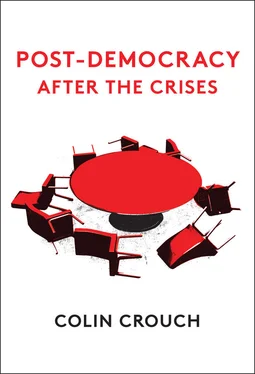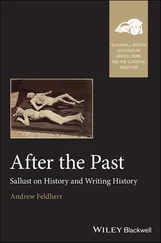The history of people’s democracy from the Russian Revolution to the collapse of the system in 1990 cannot be considered a case of the parabola of democracy, as it provided no accretion of democratic practice and institutions. Dictatorship and the persecution of opponents had settled in by the mid-1920s, and from the outset in those countries where state socialism was imposed by the Russian army after 1945. We see this legacy in the difficulty experienced by countries in the Soviet bloc in establishing democratic institutions after 1990. In Russia and its immediate neighbours, they remain very fragile if they exist at all, and state power is routinely exercised to silence opponents. Those countries further west that have joined the EU have fared better, though there has been considerable difficulty in establishing stable party systems and there are important lurches towards authoritarianism. Again, we shall return to these themes in later chapters.
Post-democracy can be said to occur only where there is a history of reasonably strong democracy, leaving behind a legacy of practices and institutions, which, while extremely valuable, by their continued presence create the impression that all is well. Post-democracy refers to a weariness with the obligations of political citizenship, alongside a complacent belief that democracy is in safe enough hands and barely needs to be practised. A striking landmark on the road to post-democracy occurred during the 2000 presidential election in the US. In a very close race, there were major grounds for suspecting vote tampering had taken place in Florida, the state governed by his brother Jeb, in favour of the successful Republican candidate, George W. Bush. The issue went to the law courts. There were some demonstrations against the outcome among black Americans, but the prevailing concern in the country seemed to be that the dispute over the outcome was depressing the stock exchange, and should therefore be abandoned. In any case, only just over 50 per cent of those eligible had actually voted. In contrast, in South Africa just six years earlier, almost 87 per cent of those eligible had voted in the first general election there in which the black majority had been entitled to do so; many had queued for hours outside polling stations. That was a democratic moment.
Конец ознакомительного фрагмента.
Текст предоставлен ООО «ЛитРес».
Прочитайте эту книгу целиком, на ЛитРес.
Безопасно оплатить книгу можно банковской картой Visa, MasterCard, Maestro, со счета мобильного телефона, с платежного терминала, в салоне МТС или Связной, через PayPal, WebMoney, Яндекс.Деньги, QIWI Кошелек, бонусными картами или другим удобным Вам способом.












